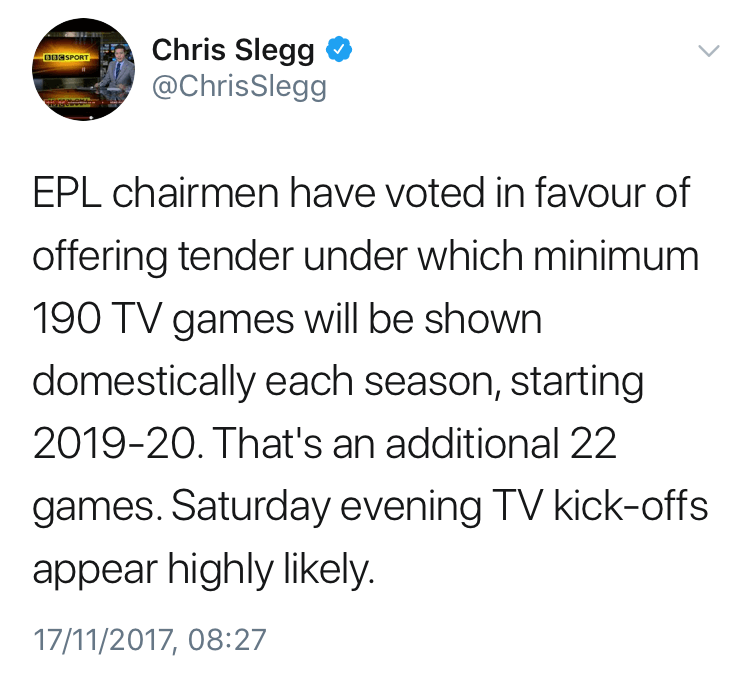As Premier League chairmen give the green light to more live televised games from 2019, which could mean the introduction of Saturday night matches, will the traditional Saturday 3 o'clock fixture soon be a thing of the past for top clubs?
It’s no exaggeration to say that football is on pretty much seven days a week these days. What with Friday night games, Monday Night Football and Super Sunday, not to mention European games being screened on Tuesdays, Wednesdays and Thursdays, you’d be forgiven for thinking that there weren’t enough days in the week for anymore.
But those in charge of the game’s top clubs would disagree and have now voted unanimously in favour of a broadcast tender under which between 190 and 210 games will be shown live on British television each season from 2019-20 and as a result surely increasing the £5.14bn paid by Sky Sports and BT Sport two years ago.
The tender will go out to broadcasters before the end of the year and will almost certainly make the world’s richest league even richer thanks to the increase in the number of live games shown, with it being hotly anticipated that live prime-time Saturday night fixtures will be slotted-in alongside additional midweek and bank holiday matches.
So how long before the traditional 3pm Saturday games are no longer?
Well, for most big clubs, this once traditional start time is already something of a novelty with clubs like Manchester United, Liverpool, Chelsea, Spurs and Arsenal sometimes only enjoying the privilege a handful of times a season; but if the clubs and TV companies have their way it could soon be consigned to the dustbin of history forever.
The biggest problem for clubs, and broadcasters alike, is the current blackout which restricts the showing of games between 2.45pm and 5.15pm, an almost archaic arrangement which dates back to the 1960s yet still has a major stranglehold when it comes to the way we watch football today.
The rule was introduced during the 1960s when Football League chairmen believed televised matches had a negative impact on attendances at games being played around the country at the same time, as fans decided to stay at home in front of the box rather than go and watch their team and back then they probably had a point.
But in the days when you can watch just about any game on the planet, where, when and how you like, this now seems like a rather futile effort to prevent an ever hungry TV audience from getting their footie fix.
And it’s not as though the clubs and the decision makers wouldn’t want to see the back of this blanket ban that was created to limit our television intake in the days when there were only three channels to choose from. Just imagine the potential of being able to show live action or even goals from the games of the day as they go in on a Saturday.
Currently, thanks to the likes of Soccer Saturday and Final Score we have to endure the agony of ex-professionals talking us through the action and telling us just what we are missing out on, rather like a group of mates peering through the letterbox at a party and informing their frustrated mates what’s going on inside.
If the blackout were to be lifted then UK viewers would be able to enjoy seeing everything as it happens, in the same way that they do in Germany with the brilliant Konferenz show or even as we sometimes do in this country on Champions League nights with BT Sport’s Goals Show or on Sky’s Gillette Soccer Special when there is a full midweek programme.
Recently Sky announced that they would be streaming every midweek Championship game live via their website from 2019 in a new £600m five-year domestic rights deal with the English Football League, allowing those fans who don’t want to make the three hour journey up the M1 the opportunity to watch their team from the comfort of their own home.
Effectively, there is absolutely no difference from showing live games or action as it happens on a Tuesday or Wednesday night than on a Saturday afternoon, especially when there are other games taking place at the same time.
The same could be said for Boxing Day or New Year’s Day when, assuming it doesn’t fall on a Saturday, TV companies are welcome to take their pick of what they show and have often been known to broadcast live games at 3pm while other games take place simultaneously.
Ultimately the way we now watch football might just signal the end of the 3pm blackout in the future. But for now at least, it is still in effect meaning that the only way broadcasters can show more of the games they pay so handsomely for is to work around the ridiculous restrictions and schedule games for all hours; which is exactly what they are doing, as long as that’s not at 3pm on a Saturday of course.
